CFA Students Recognized at the 2023 Esther B. and Albert S. Kahn Awards Reception
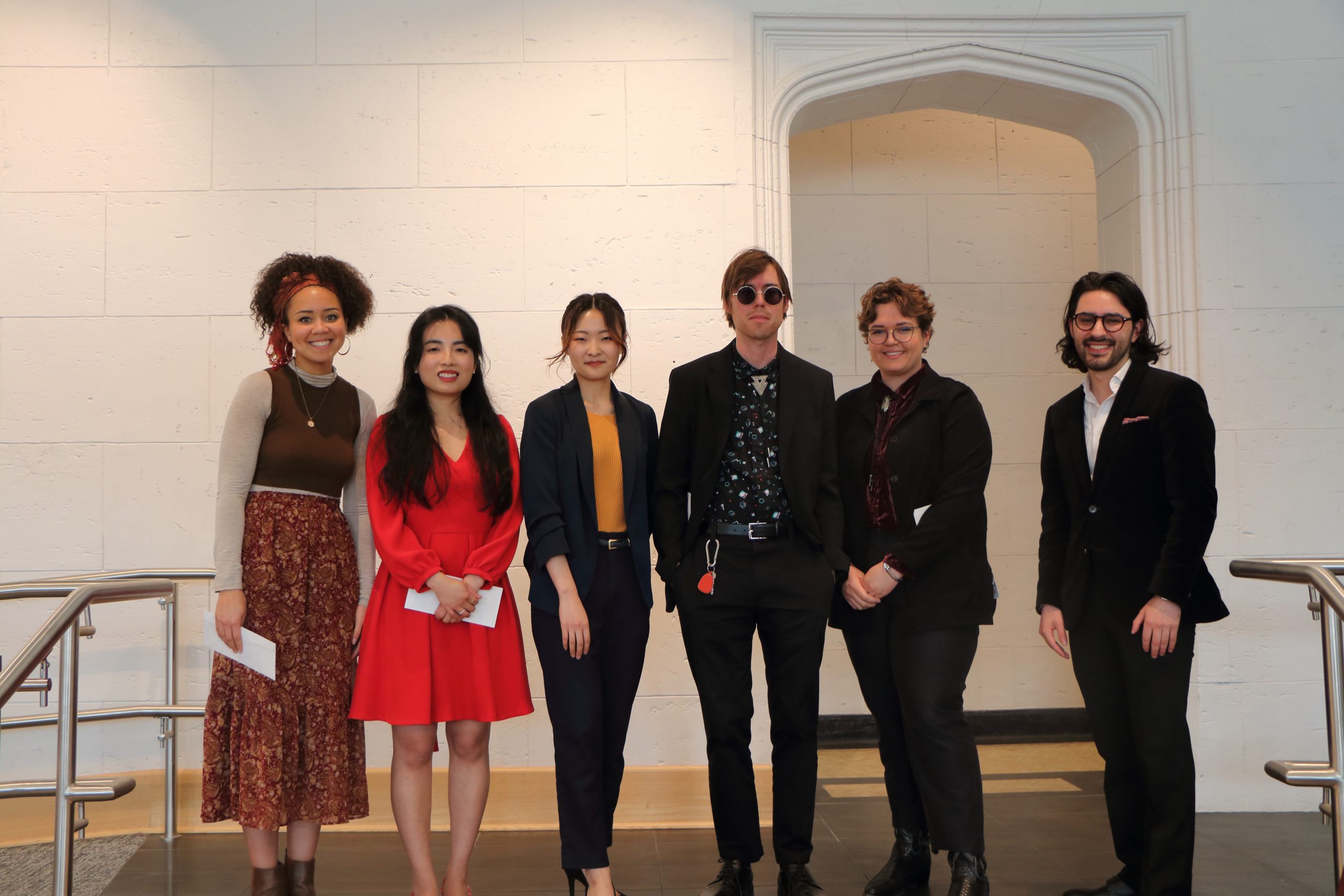
CFA Students Recognized at the 2023 Esther B. and Albert S. Kahn Awards
Six CFA students were celebrated for their work and received grants in support of their artistic pursuits after BU.
From left to right: Valyn Lyric Turner, Rayna Yun Chou, Ami Okazaki, Stephen Proski, Madelaine Kobe, and Joseph Sedarski. Photo by Emily Wang (COM’26)
Witnessing students take their talents to great heights after their time at BU College of Fine Arts is an immensely rewarding feeling for our community. Faculty and staff within our three schools – School of Music, School of Theatre, and School of Visual Arts – are committed to equipping students with the experiences, opportunities, resources, tools, and spaces to thrive in the arts industry.
CFA is thankful for endowments that help to launch our students’ careers as they enter the professional world. Every spring, CFA hosts the Esther B. and Albert S. Kahn Awards, an annual event that supports aspiring artists and soon-to-be CFA alums. Established in 1985, the Esther B. and Albert S. Kahn Career Entry Award is funded by a $1 million endowment from the late Esther Kahn (Wheelock’55, Hon.’86). Students completing the last semester of their graduate or undergraduate studies can apply to compete for the award.
Finalists are chosen based on the students’ submitted proposals detailing how they would use the award to launch their careers, their concern for social issues, and their take on the artist’s role in contemporary society. Each of the finalists receives $2,500 and the final award winner receives a total of $20,000.
This year’s jury included Ty Furman, Managing Director, BU Arts Initiative; Kara Elliott-Ortega, Chief of Arts and Culture, Mayor’s Office of Arts and Culture, City of Boston; and Jill Medvedow, Ellen Matilda Poss Director, Boston Institute of Contemporary Art.
Check out this year’s finalists and the grand prize winner, MFA Painting student Madelaine Kobe (CFA’23)!
School of Music
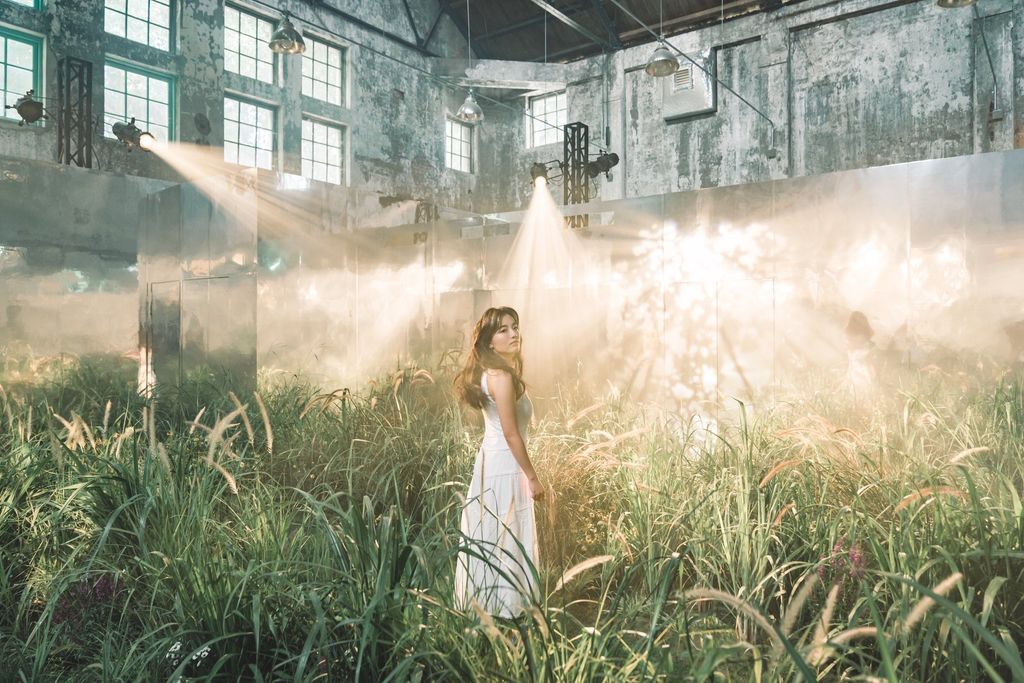
Rayna Yun Chou (CFA’23) DMA Violin Performance
FINALIST
In 2019, Boston-based violinist and interdisciplinary artist, Rayna Yun Chou established the original installation Concert for One in Boston and Cambridge. The concept was simple: one musician, one listener, one minute. In just 10 days, musicians performed for over 5,000 listeners on both sides of the Charles River. People laughed, cried, smiled, jumped, and asked for more, feeling more inspired than ever.
The success of Concert for One was evident, as it has been featured and mentioned prominently in more than 140 media outlets. “Chou had talked with fellow musicians who felt isolated from their audiences. She was also concerned classical music was becoming inaccessible to younger and more diverse audiences because it tends to be played in high-priced venues…” (Boston Globe); “The concerts are the brainchild of violist, Rayna Yun Chou, who staged similar performances in her native Taiwan in 2016 as a way to make classical music more accessible” (USNews).
Concert for One is a boundary-breaking project. It was created because I believe life is about special moments, and we as musicians have the ability and responsibility to create them. By creating more spaces and opening ourselves up for honest conversations, one-by-one, and face-to-face; spaces where there is no hierarchy, no pride, and no judgment. A space where the musician does not play to be paid and the audience does not listen to be impressed. A space where I can see your face, and you can look into my eyes.
Rayna has received numerous awards including the Boston ARTery 25 Award (2021), the City of Boston Opportunity Fund (2021), and the Mass Cultural Council Artist Fellowship and Award (2021), among others. Her first social-experimentation exhibition was One Minute of Just Us (2015-2016) where she challenged and renewed the relationship between audiences and performers with the goal of making music more accessible. Her most recent large-scale art installation Hear the Light (2020), which premiered in Taiwan, was a conceptual immersive exhibition that combined time-based sound and light installations. Audiences were encouraged to immerse in music and embrace both the darkness and the light.
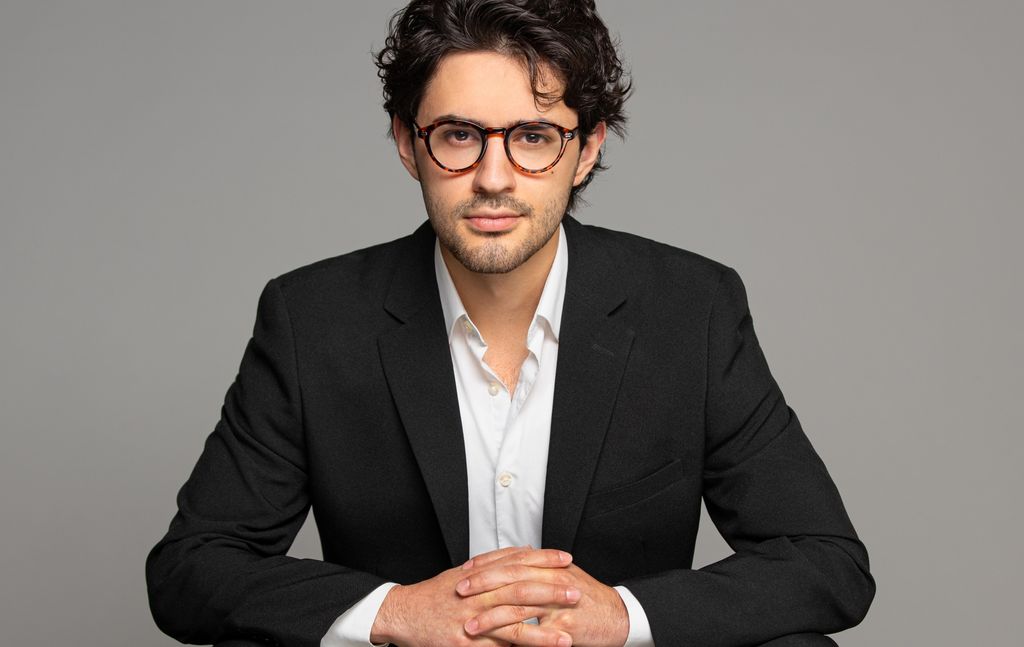
Joseph Sedarski (CFA’23) BM Composition
FINALIST
Composer and non-profit marketing specialist Joseph Sedarski engages in projects that align with his commitment to uplifting marginalized musical traditions and composers. Since 2020, Joseph has worked with the non-profit organization, Juventas New Music Ensemble, where he’s produced over 20 concerts featuring the music of underrepresented and up-and-coming composers. Joseph also helped facilitate organization wide-shifts to hybrid programming resulting in reaching 30,000 people from across 49 countries! He talks about his experience working with Juventas New Music Ensemble in CFA’s Student Internship Series.
With the Kahn Award, Joseph would have the opportunity to travel internationally to the 7th Musa Hellenica Festival to give presentations on his music, the music of Mexican composers, and the music of the late Hungarian composer György Ligeti.
Much of my musical training I owe to my rich family culture and history that stems from my native Meso-American and Spanish colonial roots. In fact, my great-great grandfather was a composer himself and wrote multiple works of Mexican music; all of which are largely unknown to the greater repertoire. My work Promesa seeks to keep his music alive through the retelling of his life story and spark conversation about little-known concert music by Mexican composers.
After graduation, Joseph plans to work with local Boston musicians to record three pivotal works from his repertoire. “These works are Gradus ad Paradisum, which was inspired by own mental health journey and is a tribute to those that have lost loved ones to suicide; Promesa, which was inspired by the music of my great-grandfather Luis Rice a largely unknown Mexican Composer; and Valz Esther, which is a piece composed by my great-grandfather Luis Rice and has never been recorded in the half-century since its composition,” says Joseph, whose works represent his commitment to producing music that is mission-oriented, relatable, and involves the music and stories of underrepresented composers and musicians.
listen to joseph’s work, promesa
School of Theatre
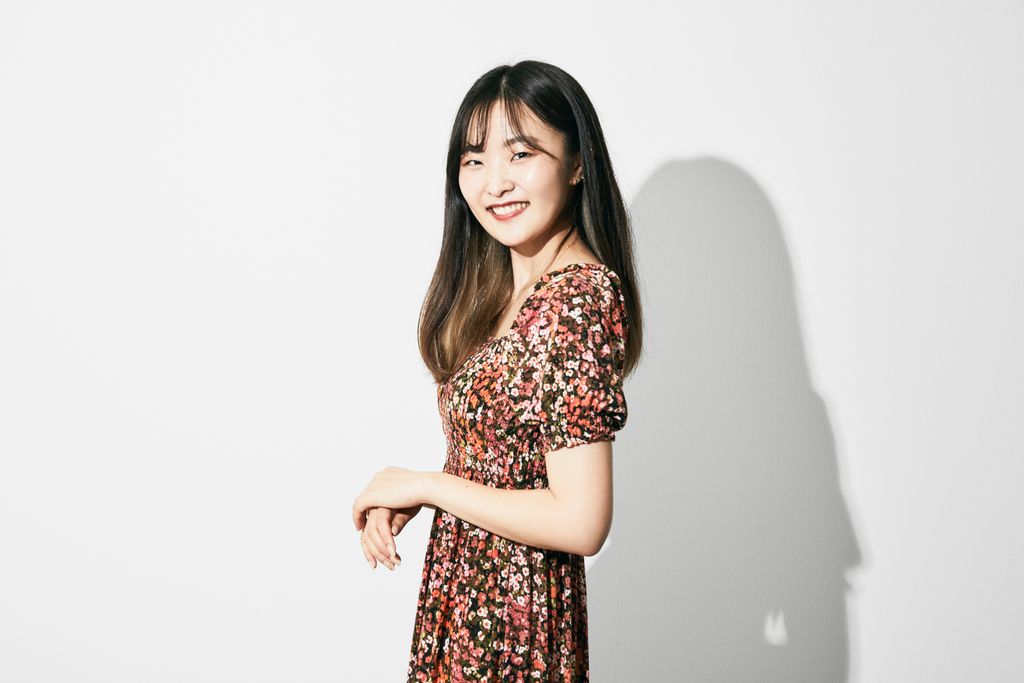
Ami Okazaki (CFA’23) MFA Scene Design
FINALIST
As an Asian scenic designer, Ami Okazaki has observed the lack of Asian, Asian American, and Pacific Islanders (AAPI) designers in the industry. She seeks to create storytelling opportunities with diverse artists and organizations such as the Asian American Theatre Artists of Boston (AATAB) and the National Asian American Theatre Company (NAATCO).
During her time as an MFA scene design student, Ami has worked on 12 pieces, including being the lead scenic designer for BU’s production of Little Women, a co-production of BU School of Music Opera Institute and BU School of Theatre. She’s also worked with acclaimed industry professionals through the multi-media content studio, CHOCOLATE Inc. In CFA’s Student Internship Series, Ami shares her most exciting moment – becoming the associate production designer of an original feature film called Mondays, which played in over 40 cinemas across Japan. This year, Ami was part of a creative planning team for a live exhibition at PARCO Art Museum in Tokyo. The team created an interactive space that allowed patrons to experience the emotion, history, and interconnectedness of people through voices and sounds.
I am happy to see the number of AAPI stories told by AAPI creators is increasingly rapidly, especially in the film industry. However, Asian voices are still underrepresented in theatre. Listening to other Asian stories and finding a personal, emotional connection with them allows me to truly be proud of who I am and where I came from. I want to create more storytelling opportunities that encourage the AAPI community to celebrate themselves.
Next for Ami? She plans to apply for mentorship and fellowship programs that emphasize racial justice and diversity in theatre, such as New York Theatre Workshop’s 2050 Artistic Fellowship and Wingspace Theatrical Design’s Mentorship program. In addition, Ami wants to continue exploring different tools and skills that’ll expand their artistic abilities. She’s currently pursuing New York University’s online certificate for Film and TV essentials and continuing to develop her Adobe Suite skills and digital drafting skills. For Ami, learning new visual languages is essential to enhance her scene designs.
see another production ami was scene designer of

Valyn Lyric Turner (CFA’23, CAS’23) BFA Theatre Arts
FINALIST
For actor, playwright, and poet Valyn Lyric Turner, representation matters. When she entered her first year as a BFA theatre performance student, she had no teachers that looked like her. The core faculty were white and taught the techniques of white male performance scholars. As she enters the theatre industry as a working artist, Valyn’s goal is to build her artistic resume and pursue an MFA program in either acting, directing, or playwriting, bringing the knowledge and skills she develops to undergraduate theatremakers.
Valyn has witnessed this first hand, seeing in her work with student artists as a Teaching Assistant at the BU Summer Theatre Institute the way the few Black artists in the program banded together and gravitated towards the faculty members of color. “We must have in positions of leadership committed, empathetic, and unapologetic Black artists,” says Valyn, who in her spoken word activism focuses on race in the classroom and seeing color. Through her work with K-12 school districts across the country, Valyn has impacted more than 10,000 educators and students with her poetry. Her most famous poem is “Race in the Classroom,” which invites educators to see color rather than manufacturing a “colorblind” learning environment.
I aspire to follow in the footsteps of Chris Edwards, Patrese McClain, Kirsten Greenidge, and many of my other brilliant mentors at BU School of Theatre, in building my career and philosophy as an actor of color, then bringing it into the collegiate classroom and developing the coming generations of social justice-minded performers. I want to teach theatre in higher education so that serious actors of colors know they don’t have to erase their heritage or contort themselves into one antiquated image of a great actor in order to be great.
Valyn plans to teach Spanish (she’s also a Spanish major) at an independent language school in Cambridge as she auditions for theatre opportunities in Boston. She hopes to produce another iteration of her play, MARIAN, an adaptation of Robin Hood re-centered on a biracial Lady Marian, which had its premiere in December 2022 at the Locust Grove High School in Henry County, Georgia. Valyn is a Georgia native, who also plans to conduct further research for her new play, HALF, which deals with collective memory in mixed families, biracial identity, and single parenthood.
check out Valyn’s CFA TERRIER TUESDAY feature
School of Visual Arts
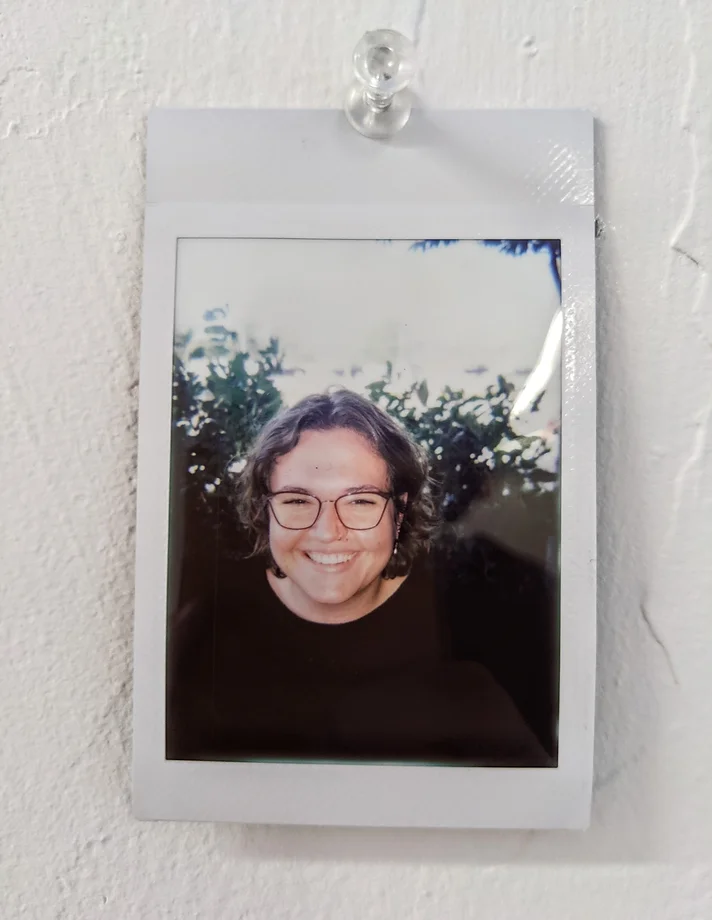
Madelaine Kobe (CFA’23) MFA Painting
GRAND PRIZE WINNER
Embarking on the journey of a self-directed residency and research trip through Appalachia, Madelaine Kobe is dedicated to producing new work rooted in Appalachian craft and storytelling traditions. As an artist from the American South, Madelaine’s work is deeply informed by the landscape, histories, folklore, and music of the complex places she calls home.
Madelaine’s first experiences in an art community were in quilting groups at her family’s church, where she felt a sense of belonging and learned how enriching it can be to build something with your own hands. Returning to Central and Southern Appalachia, Madelaine plans to study the history and practice of mountain craft and storytelling and to better understand the connection between the region and time, history, and art objects we create.
In immersing myself in this region, I am interested in how the stories we tell relate to our individual and cultural identities, our relationship with the land, and the art objects we create. How do these traditions separate and unite us? How does the use of local material, that which is directly in front of us, drive my own practice and the work of those around me? How are the materials and traditions being transformed into something new? How do we craft stories of acceptance, amongst stories of denial and loss?
Madelaine has already begun connecting with artists who work in craft centers between Alabama and West Virginia. She will spend a large portion of this residency working with them and teaching workshops together. Some of the centers are the Hambidge Center, Penland School of Craft, STARworks, and the John C. Campbell Folk School, among others.
watch madelaine’s unique ink-making process
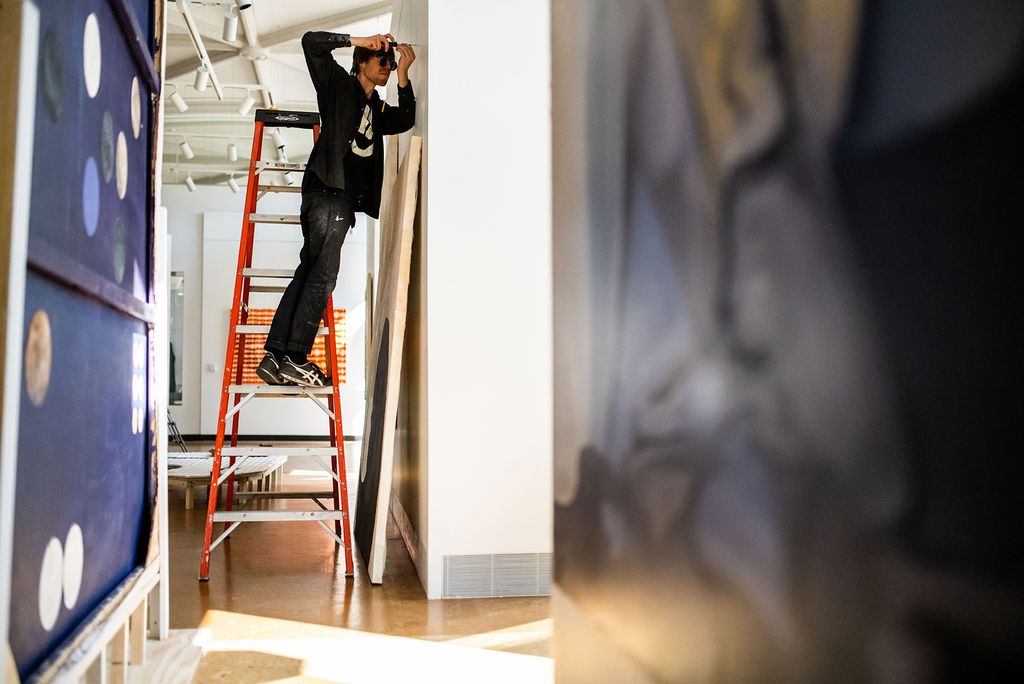
Stephen Proski (CFA’23) MFA Painting
FINALIST
As a blind artist, Stephen Proski debunks the myth that blind people don’t know, understand, or care about the visual arts. Stephen’s work engages an able-bodied audience through the lens of disability, and through that lens, disability art as a movement gains broader public recognition and awareness.
Stephen seeks to dive deeper into artistic strategies that supplement visual language by establishing a professional studio practice in Boston and amplifying his advocacy through the curation of an exhibition of work by artists who are considered disabled. Stephen uses materials, like resin, concrete, clay, and wood, to inform his practice. “The tactility that clay provides has largely molded my practice into encountering things haptically rather than optically, using clay as the medium to confront the psychological and real-world complexities of blindness,” says Stephen, whose work conjures lived experiences of blindness that often implicate and antagonize the body into moments of discomfort, empathy, and introspection.
Art opens the door for disabled people to understand their own experience differently from the mainstream, which inevitably improves access and expands community. Through my studio and curatorial work, my goal for this important award is to build on my practice that advocates for a language of accessibility and accommodation in a seemingly inaccessible world, a world that is dominated by the hegemonic forces of vision and power.
Receiving the Kahn award will help Stephen continue making work that addresses these specific issues related to his practice. Having access to the materials and space he’s grown accustomed to is critical for his development as a student transitioning into the professional world. Stephen hopes to become more closely involved with the blind community in Boston as he works on exhibitions.
see bu today’s story on the 2023 mfa thesis shows where stephen is featured
Thank you to this year’s judges: Ty Furman, Managing Director, BU Arts Initiative; Kara Elliott-Ortega, Chief of Arts and Culture, Mayor’s Office of Arts and Culture, City of Boston; and Jill Medvedow, Ellen Matilda Poss Director, Boston Institute of Contemporary Art.